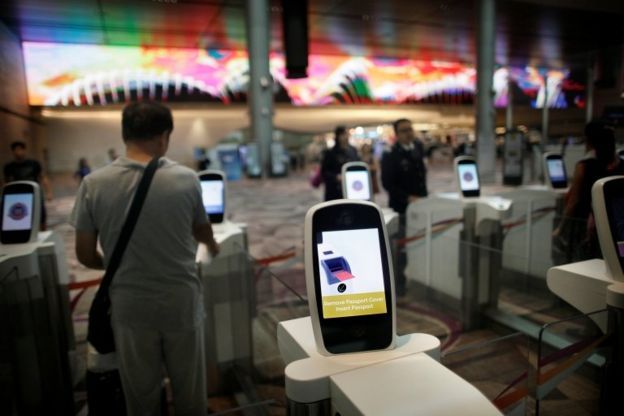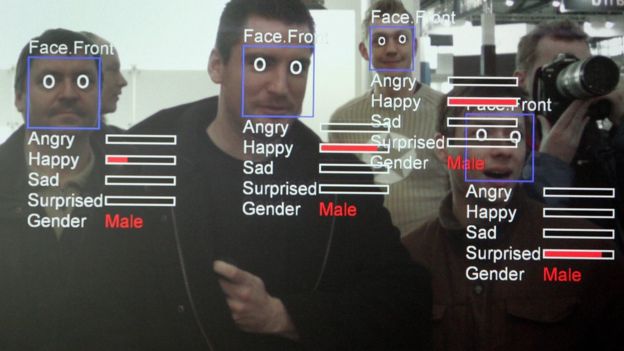AR, VR, autonomous cars are three technologies that once seemed like futuristic science fiction, yet they are mainstream today. Facial recognition is another amazing technology that has arrived on the scene and is dramatically changing how we conduct our personal and professional lives.
Singapore’s Changi airport is testing a facial recognition system to expedite travelers. The facility is expanding existing uses of the smart ID system and looking into ways to replace passport checks. Naturally, there are doubters. Reuters reports proposals to use cameras mounted on lamp posts that scan faces to ID passengers has raised privacy concerns. For the sake of balance let’s consider some positive use cases.

Pros
One would be to spot passengers who have missed the last boarding call for their flight. The newest terminal at Changi, T4, is already using facial recognition for self-service check-in options as well as bag drop, immigration and boarding. This means fewer queues and fewer visible airport or security staff, which spells cost reduction.
The way it works is passengers drop luggage at unstaffed booths. A photo of their face is taken and then matched against the picture in their passport. The automated security gate checks immigration status with the photo, while another snap is taken and is used to verify a passenger’s identity at the boarding gate. This process is faster and smoother for the busy traveler, yet some challenge the application of this new technology. Remember the guys with red flags who had to walk in front of the early ‘automobiles’?
Cons
The challengers tend to be powerful, large bodies who resist change. Consider the American Civil Liberties Union, the ACLU. Only last month, the BBC reported that the rights group had urged Amazon to stop providing its Rekognition facial recognition technology to American police forces, saying a guide for the software “reads like a user manual for authoritarian surveillance.” Amazon responded robustly, saying the quality of life would be much worse if new technologies were blocked because of how they might be used. Indeed.
Mind you, Amazon may not be the best organization to earn trust for face recognition technology. The news that one of its Echo devices recording a conversation in a family home and sending it to someone else illustrates the power of these new technologies. People must be ultra responsible when using such AI devices as they can have a mind of their own, which has proven to have negative consequences in some cases.

Face Recognition for Event Marketing
Before getting embroiled in a big debate, let’s talk about the positive impact of face recognition technology in marketing and events – how does it work?
The use of physical tokens and privileged information is integral to successfully running events for many reasons. The data provided is used to check in people, restrict access, personalize the experience, measure attendance, extract analytics, and perform lead retrieval.
Facial recognition belongs in the third form of authentication along with other biometrics approaches. It is a software, which can identify a person from a database of faces without requiring a physical token or the user to provide any privileged information. Technological advancements have increased accuracy and are now drastically reducing costs.
I chuckle to myself whenever I check in to a high tech event for a mega-company and wait in line for someone to tick off a spreadsheet or hand write my badge. The irony is the badge maker is a leading CRM company!
Visitors to events are not always good at following instructions displayed on terminals. They cannot find their ticket; it takes them a while to retrieve the QR code on their phone or they simply need time to type in their email address.
Instant Access
Facial recognition addresses the root cause of the problem by eradicating the need for user actions. Depending on your preference, you may want to implement a self-service or a hosted check-in mode. In either case, the premise is the same. When an attendee approaches the check-in station they will be instantly identified without them having to take any action.
Simple.
And the best part is you don’t need to purchase expensive hardware because any device with a camera works. This includes virtually all laptops, tablets, and smartphones. In addition to making the check-in process more efficient and thus reducing costs, facial recognition has been proven to increase user engagement and attendee satisfaction. It is an excellent way to promote the innovative nature of a brand and impress attendees.
Enhancing the Attendee Experience
And that’s not it. The tech can be used for session tracking as well. Event hosts spend a significant amount of time recruiting speakers, curating the content of their shows, and organizing sessions that cover different aspects of the event theme. In addition, conferences with a deep educational focus often assign credits and accreditation to participants who attend specific sessions.
Facial recognition is a good fit for this because it requires minimal setup and extracts analytics in a non-intrusive manner. Depending on different technical factors, session tracking can be as simple as putting a tablet or cell phone on a stand near the entrance of each room. The camera will automatically capture the video stream and send it to the cloud for processing. There is no need for special hardware and expensive installation costs.
And, it can go further with just a little imagination. One can use screens (equipped with a camera) around the venue that identify attendees and display personalized information ranging from where food is being served to which is the next session they should attend. Likewise, the information desk personnel could be equipped with similar capabilities. Being able to identify a person while they are walking towards the desk allows them to personally greet them and anticipate their needs.
After just a little bit of research I am super excited about face recognition technology and the possibilities it opens for marketing and sales! I am not being futuristic when I say it won’t be long before we offer it to our own clients for lead retrieval.